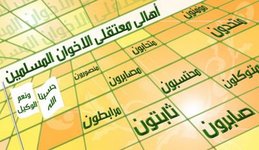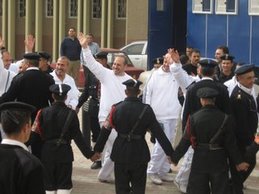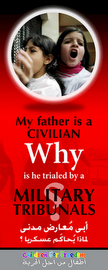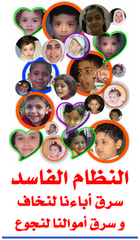
Tuesday, March 06, 2007
Westerners assume Middle Eastern bloggers are liberal. But the Muslim Brotherhood has just started blogging in force.
The recent wave of internet activism in Egypt has followed an increasingly familiar pattern. A series of blogs devoted to Egyptians arrested for their political beliefs has sprung up, linked together by a few highly trafficked hubs. Some of the the blogs focus on personal matters, describing the prisoners' families, lives and good works. Most feature embedded videos from the courtrooms and high resolution photos of grim security forces and passionate protestors. There are online petitions to sign, banners to exchange, and an attempt to forge broad ideological coalitions. But this is not the "Free Kareem" campaign that has captured international attention. Instead, the latest Egyptian bloggers and their subjects are from the Muslim Brotherhood, and the man whose freedom is being demanded is the second deputy chairman of the organization.Over the last few months, young Muslim Brotherhood members have begun blogging in force. This sudden, dramatic development may come as a surprise to western observers, who generally assume that blogging empowers liberal, pro-western voices. And it's true that the first wave of Arab political blogging featured mostly westernized, relatively liberal voices writing in English - often brilliantly individual voices who made little claim to represent the broader political spectrum. Much coverage of the Arab blogosphere continues to focus on these voices, and the attention has helped generate impressive global campaigns in support of bloggers like Kareem, an anti-Islamist writer sentenced to four years in prison for his blogging, and Alaa Abd al-Fattah, who spent 40 days in prison for his political activism.But the Arab political blogosphere has changed. Over the last couple of years, a new wave of more politically engaged bloggers has emerged, often writing in Arabic and deeply connected to local political campaigns. The young Bahraini bloggers who denounce repression against human rights NGOs, or the young Egyptians using blogs to support the Kefaya movement and expose police brutality still fit a recognizably liberal story of popular empowerment. But the Egyptian Muslim Brothers using the same blogging platforms and the same campaign strategies to raise awareness of the imprisonment and mistreatment of their brethren do not.The Brotherhood's blogging campaign was triggered by a regime crackdown that occurred after a group of al-Azhar students was photographed practicing martial arts. A large group of students and a number of Brotherhood members were arrested, and their cases were referred to the notorious state security courts. Supporters of the students launched a website as a clearinghouse for information about the case. The blogging campaign got going in February, with the launch of a number of new blogs geared towards publicizing the plight of the arrested Brotherhood leaders and students. One of the most popular of these blogs, Ensaa, launched in early February under the slogan "Release Egypt! A forum for rejecting military trials of the innocent", imitated Wail Abbass's influential al-Wa'I al-Masry by posting videos of protests, long sequences of photographs, first-hand accounts of the mistreatment of arrested Muslim Brothers, and a long list of banners calling for freedom for dozens of arrested Brothers. Ensaa has had over 60,000 visitors in its first month. And at least a dozen of the families of the imprisoned Muslim Brothers have created a blogs dedicated to the release of their kin.
The driving force behind this campaign seems to be an energetic 27 year-old Egyptian Muslim Brother journalist and webmaster named Abd al-Monem Mahmoud. Blogging under the title "I am Ikhwan" in both Arabic and English, Mahmoud has received almost two hundred thousand hits since launching in October 2006. He maintains a lengthy blogroll, including some in English, and has worked hard to encourage members of the Brotherhood to adopt the format and to publicize its efforts.There is nothing new about Islamists adapting quickly to new information technologies, of course. The Muslim Brotherhood has long had popular, content-rich websites in both English and Arabic. Islam Online offers news, commentary, and live dialogues and fatwa sessions with leading Islamist figures in both Arabic and English. Jihadist forums and online libraries have become a leading concern of those focused on al-Qaida. Still, many people thought that blogs would be an exception because of their individual, personal nature. That argument has become much harder to sustain after this new round of Muslim Brotherhood blogging.Still, the Brotherhood's online activity has more in common with the secular political activists of the younger generation than with the older members of the Brotherhood. Today's younger Muslim Brothers are trying to harness blogging technology to generate the kinds of solidarity, support and attention that Alaa Abd al-Fattah and Kareem have enjoyed. That seems unlikely, given the suspicion of the Brotherhood in the west and the Brotherhood's generally anti-liberal cultural views - as well as the language barrier (most of the blogs are in Arabic). But perhaps the bloggers could contribute to generational and political solidarity across ideological lines. Many Egyptian bloggers and political activists understand what many in the west do not: The Egyptian regime's repression of the Muslim Brotherhood and its repression of liberal bloggers are part and parcel of the same despotic impulse.Beyond the immediate campaign, what might the Brotherhood's blogging portend? Perhaps the blogs could put a more differentiated, human face on an often-demonized organization - although the language barrier and cultural differences still loom large. The greatest impact of the new blogging trend, however, might be internal to the Brotherhood. The new outlets may allow a younger generation of Muslim Brotherhood voices to be heard, challenging entrenched dogma and empowering reformist or independent voices. According to an article posted on an official MB website, "with the spread of weblogs among MB young men, there emerge free areas in which they can express themselves spontaneously and in simple words avoiding the phraseology of the group's cadres and leaders." But whether their blogging will be limited to political campaigns, or evolve into something more challenging, remains to be seen.






















2 comments:
Genial post and this mail helped me alot in my college assignement. Thank you as your information.
سبحان الله هالدول تبي تضيق على شعوبها باي طريقه .تبي تخلي المواطن يكرف كرف وتشغله في لقمته وفي أقساط وفي العلاج .وحتى الخدم تدخلت فيهم علشان الواحد وين ما يطقها عوجه .ويجيه عوار القلب من كل مكان .لاحول ولا قوه الا بالله
Post a Comment